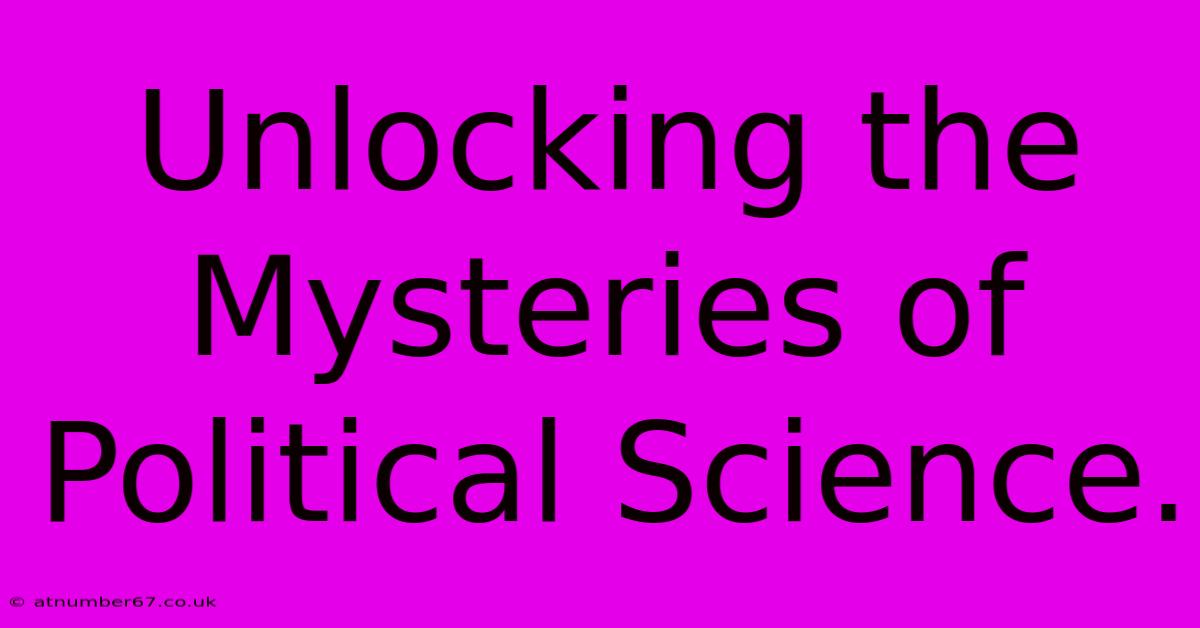Unlocking The Mysteries Of Political Science.

Table of Contents
Unlocking the Mysteries of Political Science: A Comprehensive Guide
Political science, often perceived as a dry recitation of facts and figures, is in reality a vibrant and dynamic field exploring the power structures, ideologies, and behaviors that shape our world. This guide delves into the core concepts, methodologies, and enduring questions that drive this fascinating discipline.
What is Political Science?
At its heart, political science is the systematic study of government, politics, and policy. It seeks to understand how power is acquired, exercised, and challenged, both within and between nations. It's not just about memorizing presidents or reciting constitutional amendments; it's about analyzing the why behind political events and the complex interactions between individuals, groups, and institutions.
Key Areas of Study Within Political Science:
- Comparative Politics: This branch examines political systems across different countries, identifying similarities and differences in their structures, processes, and outcomes. Think about comparing the parliamentary system of the UK to the presidential system of the US.
- International Relations: This field explores the interactions between states, international organizations, and non-state actors. It delves into topics like diplomacy, war, international law, and globalization.
- American Politics: Focusing specifically on the United States, this area examines the country's political institutions, political parties, elections, public opinion, and policy-making processes.
- Political Theory: This branch delves into the philosophical underpinnings of political thought, exploring concepts like justice, liberty, equality, and democracy. Thinkers like Plato, Aristotle, Locke, and Rousseau are central to this area.
- Public Policy: This area focuses on the creation, implementation, and evaluation of government policies. It analyzes the impact of policies on society and explores the political processes involved in policy-making.
- Public Administration: This branch studies the management and implementation of public programs and services, focusing on the efficiency and effectiveness of government agencies.
Understanding the Methods of Political Science
Political scientists employ a range of methods to investigate their research questions. These include:
- Quantitative Methods: This approach uses statistical analysis of large datasets to identify patterns and correlations. For example, analyzing voting data to understand electoral behavior.
- Qualitative Methods: This involves in-depth analysis of case studies, interviews, and documents to gain a richer understanding of complex political phenomena. Think of conducting interviews with political elites to understand their decision-making processes.
- Mixed Methods: This combines both quantitative and qualitative approaches to provide a more comprehensive understanding of the research question.
Enduring Questions in Political Science
Political science grapples with many enduring questions, including:
- What is the best form of government? This classic question explores the merits of different governmental systems, from democracies to authoritarian regimes.
- How can we promote peace and security in a world of competing interests? International relations scholars grapple with this complex issue.
- How can we achieve a more just and equitable society? Political theorists and policy analysts engage with this question continuously.
- What is the role of the state in a globalized world? This question explores the changing relationship between national governments and international forces.
- How does public opinion shape political decision-making? This question explores the interplay between citizens and their government.
Why Study Political Science?
Studying political science equips individuals with valuable skills applicable to a wide range of careers:
- Critical Thinking: Analyzing complex political issues and forming well-reasoned arguments.
- Research Skills: Conducting research, collecting and analyzing data, and writing persuasive reports.
- Communication Skills: Articulating ideas clearly and persuasively, both orally and in writing.
- Problem-Solving Skills: Identifying and evaluating policy options to address complex social problems.
Political science isn't just about understanding the past; it's about shaping the future. By engaging with its core questions and employing its diverse methodologies, we can better understand the world around us and work towards creating a more just and equitable society. The mysteries of political science are indeed waiting to be unlocked – and the journey of discovery is both challenging and rewarding.

Thank you for visiting our website wich cover about Unlocking The Mysteries Of Political Science.. We hope the information provided has been useful to you. Feel free to contact us if you have any questions or need further assistance. See you next time and dont miss to bookmark.
Featured Posts
-
Mrs Lowry And Son Beyond The Brushstrokes
Apr 02, 2025
-
Arjun Kapoors Net Worth A Comprehensive Overview
Apr 02, 2025
-
Trishas Age A Woman Of Substance
Apr 02, 2025
-
Flavio Briatore From Racing To Riches Net Worth Revealed
Apr 02, 2025
-
Nagarjunas Son Beyond The Glamour
Apr 02, 2025
